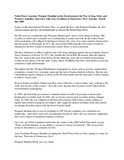| dc.description.abstract | Today on this International Women's Day, we spend the hour with Wangari Maathai, the first African woman and first environmentalist to receive the Nobel Peace Prize.
Her life story is a remarkable one. Wangari Maathai grew up in a rural village in Kenya. She excelled at school and eventually won a scholarship to attend university in the United States. After graduating with a degree in biological sciences she went on to earn a master's degree from the University of Pittsburgh. In 1971, she received her PhD from the University of Nairobi, making her the first woman in eastern and central Africa to earn a doctorate.
She then embarked on what would become a life-long campaign against the government-backed forest clearances in Kenya. In 1977, she founded the Green Belt Movement when she planted nine tree seeds in the yard of her house. In the following years, she succeeded in persuading women across Africa to do the same. Today, about 30 million trees have been planted across the continent to fight deforestation.
Throughout her life, Wangari Maathai has campaigned on issues such as poverty, malnutrition, corruption, women's low economic status and the lack of media freedom in Kenya. She has also criticized the negative images of Africa in the Western media and the reluctance of rich countries to relieve Africa's debt.
Kenya's former president, Daniel arap Moi, once called her a "mad woman," and "a threat to the order and security of the country." Over the years, she has been arrested several times for her environmental campaigning.
In 1989, she forced the government to abandon plans to build a skyscraper to house party headquarters on public land. In 1992, she was beaten unconscious by police during a hunger strike. In 1999, she was whipped on the head and arrested while trying to plant saplings to replace trees felled by property developers. She caught the nation's attention when she insisted on signing the police report with the blood from her head.
Wangari Maathai tried to run for president in 1997 but her candidacy was cancelled on a technicality. After Moi's party lost a presidential election in 2002, she was elected to parliament and is now deputy environment minister on Kenya.
Last year, the Nobel committee named her the winner of the 2004 Nobel Peace prize saying, "Peace on Earth depends on our ability to secure our living environment." She received the award in December at a ceremony in Oslo.
Amy Goodman:Wangari Maathai, accepting the Nobel Peace Prize in Oslo, joining us today for the hour. Welcome to Democracy Now!
Wangari Maathai:Thank you very much.
Amy Goodman:It's an honor to have you in our humble firehouse studios.
Wangari Maathai:It's wonderful to be here. Thank you very much for having me.
Amy Goodman:I know you're heading back to Kenya tonight. Can you go back to the moment when you heard that you had won the Nobel Peace Prize? Where were you?
Wangari Maathai:I was on my way to my constituency, and this is something I do often on Fridays, because for the rest of the week I'm attending Parliament in Nairobi and attending to my ministerial duties. But on Fridays and most of the weekends, I'm in the rural areas tending to my constituents. So, I was actually on my way. I had a meeting there, and I also was going to participate in the issuing of cards to the youth. So, I was doing what I always do over the weekend.
Amy Goodman:So, how did you learn? A telephone call?
Wangari Maathai:A telephone call came first from the Norwegian Ambassador in Kenya, and he told me that I want you to keep your telephone free, because you are going to be called within some minutes from Oslo, and they have some news for you. And well, I thought maybe it is—maybe it is something that has to do with... | en_US |

